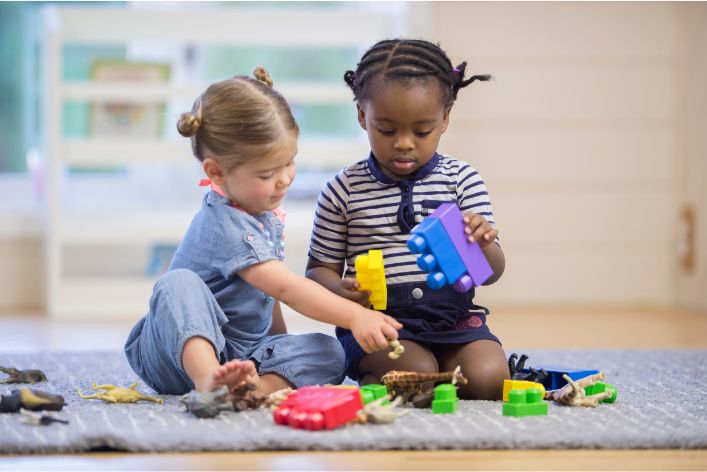Introduction
Raising kids in Nigeria can be a challenging task, and understanding their milestones is crucial for their development. As a parent or caregiver, it is important to comprehend how these milestones affect your child’s growth and well-being.
Milestones refer to the significant events or achievements that children experience as they grow and learn. These milestones cover various areas of development, including cognitive, emotional, and physical.
For instance, understanding a child’s language development milestones will enable caregivers to identify when communication problems and language delays arise. This can prompt intervention measures, which can prevent future learning challenges.
Additionally, recognizing physical milestones like crawling and walking can help detect possible motor dysfunction in children. Understanding these milestones can also foster a healthy parent-child relationship, as caregivers can provide appropriate support and guidance based on their children’s abilities and deficiencies.
As a parent or caregiver, you have a crucial role in shaping and nurturing your child’s development from infancy to adolescence.
Understanding their milestones will help you create a parenting approach that fosters a well-rounded and developmentally appropriate environment for your child. Knowing what to expect and when to intervene will positively impact their social, emotional, and cognitive development.
Therefore, it is essential to pay attention to your child’s progress, seek timely intervention when necessary, and celebrate their achievements, no matter how small.
Understanding Milestones
Milestones are a set of skills or abilities that an individual is expected to achieve at a certain age. These are significant because they help in tracking the physical, cognitive, social, and emotional development of a child. It also alerts parents and caregivers to identify possible developmental delays and intervene early.
Types of Milestones
- Physical Milestones: These are developmental skills that involve movement and coordination of the body. Examples include crawling, walking, running, jumping, and writing.
- Cognitive Milestones: These are intellectual skills that involve learning, thinking, and problem-solving. Examples include recognizing colors, shapes, and letters; counting, and storytelling.
- Social Milestones: These are skills that enable children to interact and communicate with others. Examples include smiling, laughing, making eye contact, playing with peers, and cooperating with others.
- Emotional Milestones: These are skills that involve managing one’s own feelings as well as understanding the emotions of others. Examples include showing empathy, expressing emotions, and regulating one’s own emotions.
Examples of Milestones for Different Age Groups
Infants
- Lift and turn their head while lying on their stomach (Physical)
- Recognize the sound of their caregiver’s voice (Cognitive)
- Smile and coo in response to social interactions (Social)
- Respond to comfort when upset (Emotional)
Toddlers
- Walk independently and climb stairs (Physical)
- Identify body parts and objects (Cognitive)
- Play alongside other children and take turns (Social)
- Show affection and initiate hugs (Emotional)
Preschoolers
- Hop, skip, and jump (Physical)
- Tell stories and ask questions (Cognitive)
- Maintain friendships and take part in group activities (Social)
- Show more independence and express pride in accomplishments (Emotional)
School-Age Children
- Ride a bicycle and participate in organized sports (Physical)
- Read and comprehend chapter books (Cognitive)
- Understand social rules and engage in teamwork (Social)
- Show empathy and handle conflicts appropriately (Emotional)
It is important to note that children develop at their own pace, and not all children achieve milestones at the same time. However, if a child is significantly behind in achieving milestones, it is important to consult with a healthcare provider or early childhood specialist for further evaluation and support.
Understanding milestones and tracking a child’s development is a vital tool for parents and caregivers. It enables them to provide appropriate support and guidance to their children, setting them up for success in the future.
Read: Introducing Solids: A Starter Guide for New Parents
Culture and Milestones
Culture plays a significant role in shaping the way children are raised and the milestones they achieve.
Influence of culture on milestones
Culture influences how children reach developmental milestones by shaping their beliefs, values, and practices.
- For example, in some cultures, toilet training starts early and is considered a critical part of a child’s development.
- Other cultures believe in co-sleeping with a child, which may impact their ability to sleep independently later in life.
- Cultural practices can also determine when children are allowed to have certain responsibilities like cooking or participating in religious activities.
It is essential to acknowledge that culture affects milestones to understand why we have different developmental trajectories across cultures.
Cultural Practices that impact development
Cultural practices can positively or negatively affect child development, depending on the specific practice.
Parenting Made Just for You
Get personalized Parenting Solutions tailored to your child’s needs. Transform your parenting journey with expert guidance in 1-3 days.
Get Started- Early marriage is common in some cultures where young girls are married off before they reach puberty. This practice can negatively affect a child’s development as it may interrupt their education and emotional and social development, leading to early pregnancy and childbirth.
- Circumcision is another cultural practice that has the potential to impact the development of children, mainly when carried out in a traditional setting.
- In some cultures, children are taught to respect their elders, which may hinder their creative thinking or speaking up in certain situations.
It is essential to understand cultural practices that affect child development to provide appropriate interventions when necessary.
The importance of understanding cultural practices and their potential impact on child development
Understanding cultural practices that affect child development is crucial in developing appropriate interventions and strategies to improve a child’s development.
- Cultural activities and beliefs may help shape a child’s identity and understanding of the world around them.
- Learning about different cultures and traditions also teaches children empathy, diversity, and respect.
- By understanding and respecting different cultures, we can provide a supportive environment for children to thrive and reach developmental milestones.
Essentially, cultural practices play a significant role in shaping a child’s development and achieving developmental milestones. Understanding these practices enables us to develop appropriate interventions and strategies to help children in diverse cultural contexts.
Read: Key Developmental Milestones: A Guide for Nigerian Parents

Challenges of Raising Kids in Nigeria
Parents in Nigeria face a lot of challenges when it comes to raising children. These challenges are not just peculiar to Nigeria but are also common in other African countries.
Here are some of the most common challenges:
- Poor economic conditions: Many Nigerian parents experience financial difficulties in providing for their children’s basic needs.
- High cost of education: The cost of education in Nigeria is very high, which makes it difficult for many parents to provide their children with quality education.
- Poor infrastructure: Nigeria’s poor infrastructure, especially in rural areas, makes it difficult for parents to access basic amenities such as water, electricity, and healthcare.
- Traditional beliefs and customs: Nigerians hold strong traditional beliefs and customs, which can be a hindrance to a child’s development. For instance, some cultures discourage Western education and emphasize skills acquisition.
- Security concerns: Insecurity is a major issue in Nigeria, and parents often worry about their children’s safety, especially in rural areas.
How These Challenges Affect Child’s Milestones and Development
All these challenges can affect a child’s milestones and development in various ways:
- Poor economic conditions can lead to inadequate nutrition, poor health, and lack of access to quality education. This can delay a child’s cognitive and physical development.
- The high cost of education can limit a child’s opportunities in life and limit their chances of reaching their full potential.
- Poor infrastructure, especially in rural areas, can affect a child’s health, development, and education.
- Traditional beliefs and customs can limit a child’s exposure to new ideas, experiences, and opportunities, which can hinder their development and growth.
- Security concerns can limit a child’s access to education, socialization, and recreation, which can affect their cognitive, physical, and emotional development.
Despite these challenges, there are possible solutions that parents can adopt:
- Parents can find ways to improve their economic conditions by exploring different income-generating opportunities such as starting small businesses.
- Government and private organizations can offer scholarships and grants to support parents in providing quality education for their children.
- The government can improve Nigeria’s infrastructure by providing basic amenities such as water, electricity, and healthcare in rural areas.
- Educational campaigns can be carried out to educate parents on the importance of Western education and skills acquisition, while also preserving their culture and traditions.
- The government can improve security by providing adequate security measures and training for law enforcement agencies.
To sum it up, raising kids in Nigeria can be challenging, but with the right mindset, strategy, and support, parents can overcome these challenges and raise successful and well-adjusted children.
Read: Consequences of Nutrient Deficiencies in Children
Supporting Your Child’s Milestones
As a parent in Nigeria, it’s important to understand your child’s developmental milestones and how best to support them.
Here are some tips to help you do just that:
- Play with your child: Playing with your child is not only fun but also helps to improve various skills. For instance, playing catch with a ball can help improve their gross motor skills, while puzzles and board games can enhance their cognitive abilities.
- Encourage independence: As your child grows, encourage them to do things on their own, such as dressing themselves or feeding themselves. This helps to foster independence and build confidence, which is essential for healthy development.
- Provide a safe and secure environment: Make sure your child’s environment is safe and secure, both physically and emotionally. This means child-proofing your home to prevent accidents and ensuring that your child feels loved and supported.
- Encourage communication: Encourage your child to communicate their thoughts and feelings with you. This can help to build a strong bond between you and your child, and also help them to develop their language and communication skills.
- Seek professional help if necessary: If you have concerns about your child’s development, seek professional help. Early intervention is essential in addressing any developmental delays or issues your child may be experiencing.
- Provide a variety of experiences: Expose your child to a variety of experiences, such as museums, libraries, and nature walks. This helps to broaden their horizons and enhance their learning.
- Set achievable goals: Set achievable goals for your child and celebrate their successes. This helps to build their confidence and encourages them to strive for more.
- Foster a positive and supportive environment: Finally, create a positive and supportive environment for your child. Offer love, encouragement, and support, and let your child know that you believe in them.
The Importance of Fostering a Positive and Supportive Environment for Children
Fostering a positive and supportive environment for children is essential for healthy development. Here’s why:
- It promotes self-esteem: When children feel loved and supported, they develop a strong sense of self-esteem. This helps to build their confidence and enables them to face challenges with resilience.
- It enhances learning: Children who feel safe and supported are more likely to engage in learning and excel in their academic pursuits. A positive and supportive environment fosters a curiosity for learning and creates a desire to explore the world.
- It improves mental health: A nurturing environment helps to improve a child’s mental health. It reduces the risk of anxiety, depression, and other mental health problems that can arise when a child does not feel safe and supported.
- It builds strong relationships: Creating a positive and supportive environment for your child helps to build a strong bond between you and your child. This strengthens your relationship and helps to promote positive communication and feelings of trust.
- It promotes healthy development: Fostering a nurturing environment for your child promotes healthy development in all areas, including physical, emotional, and cognitive development. It provides your child with a solid foundation for future success.
The Importance of Seeking Professional Help if Necessary
As a parent, it’s important to know when to seek professional help for your child’s development. Here’s why:
- Early intervention is key: If your child is experiencing developmental delays or issues, early intervention is essential. Seeking professional help can help to identify any problems early on and provide appropriate support and intervention.
- It ensures proper diagnosis: Professional help ensures that your child receives a proper diagnosis and appropriate treatment. This can help to improve their outcomes and ensure that they receive the support they need.
- It provides access to support services: By seeking professional help, you can access a range of support services for your child. This can include therapy, counselling, and other interventions that can help to support your child’s development.
- It reduces parental stress: Parenting a child with developmental delays or issues can be stressful. Seeking professional help can help to reduce parental stress by providing access to resources and support services.
- It ensures better outcomes: Finally, seeking professional help ensures better outcomes for your child. It provides them with the support they need to reach their full potential and achieve their developmental milestones.
Generally, supporting your child’s milestones requires creating a positive and supportive environment, encouraging independence, providing a variety of experiences, and seeking professional help if necessary. By doing so, you can help to foster healthy development and ensure your child reaches their full potential.
Read: Dealing with Lactose Intolerance in Nigerian Children
Conclusion
Understanding milestones is critical for Nigerian parents raising children. It helps them recognize if their child is developing appropriately, allowing early intervention if needed.
Parents should prioritize child development and seek support from experts, family, and friends when necessary.
Unveil the Perfect Name that Tells Your Family's Story
Let us help you find a name that embodies your family's values, traditions, and dreams. Our personalized consultation weaves cultural insights to create a name that's uniquely yours.
Get Started


